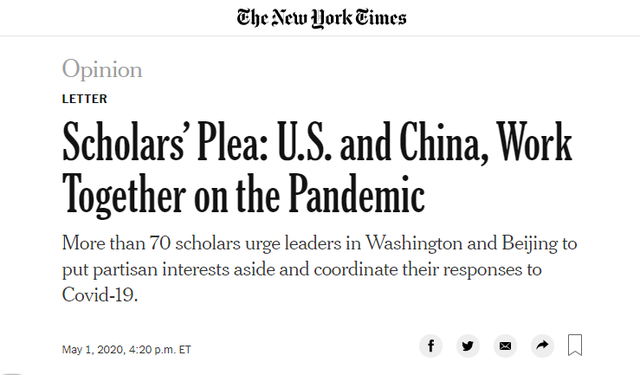Nonpartisan effort urged for COVID-19


International public health scholars implore world leaders to cooperate
More than 70 public health scholars signed a letter imploring world leaders to put partisan interests aside and coordinate their responses to the COVID-19 outbreak.
"We commend government agencies in Washington, Beijing and elsewhere for the energy they are expending to fight COVID-19. We want to implore leaders, however, against recklessly politicizing this pandemic," said the open letter issued on Friday.
Signatories included Matthew Kohrman, associate professor of medical anthropology at Stanford University; Xi Chen, assistant professor at the Yale School of Public Health; and David Christiani, professor at the Harvard T.H. Chan School of Public Health. Tian Dongxia, an associate professor from Guangzhou Medical University in Guangdong province was also among them.
In the letter, the academics said diseases necessitate governmental action and no one should try to suggest otherwise.
"Unchecked, they devastate communities and economies, ravaging the most vulnerable among us the hardest," they wrote.
The letter, published in The New York Times in a shortened version, encourages global leaders to treat the pandemic as a political foe because it has caused millions to lose their jobs and could kill untold numbers of people. They said "a powerful, multilevel, transnational, coordinated array of political responses must occur".
"The use of government authority, invoking the bully pulpit and the strong arm of local officials, is needed like never before. In other words, more politics, not less, is required when it comes to COVID-19," they wrote.
But leaders must avoid mixing the politics needed to tackle this disease with tactics designed to serve their own partisan interests, and their power should be applied "to care for others, to marshal resources for disease prevention and treatment-not to deflect blame, shore up approval ratings, settle scores, or demonize people because of ethnicity at home or abroad", they stressed. "Striking a balance, between the right and wrong ways to politicize COVID-19 responses, is hard given the tenets of containment."
They wrote that the public has been told to secure themselves, their families and their countries, but diseases know no borders and medical supply chains are international. "Scientific innovation and crisis management necessitate data sharing," they said. "Intergovernmental collaboration, as a consequence, cannot be sacrificed to containment. They must go hand-inhand."
They called on leaders to be cautious for another reason when deploying their political capital: "Relationships can take years to nurture and only moments to destroy, especially when an ill-advised tweet, meme or comment is unleashed and spreads globally. Do not be flip when it comes to your important relationships."
They said, "There is no place today for politicians who traffic in conspiracy theories or insulting language about virological origins. Now is the time, instead, for leaders to rebuild global public health alliances, such as the woefully underfunded World Health Organization, to renew scientific exchanges and to communicate respectfully across borders."
A tally by Johns Hopkins University on Sunday showed that novel coronavirus deaths in the United States had climbed by 1,450 in the previous 24 hours, bringing total fatalities to more than 67,600-by far the highest COVID-19 death toll of any country. The US had reported more than 1.15 million COVID-19 cases as of Sunday.
Globally, there were 3,356,205 confirmed cases as of Sunday, including 238,730 deaths, the World Health Organization reported.
People in many parts of the US went to beaches, golf courses and parks over the weekend-or got haircuts and in some cases tattoos-as many states eased stay-at-home rules used to stop the virus' spread.
Former US Food and Drug Administration Commissioner Scott Gottlieb warned on Sunday that if states allow schools, workplaces and other public areas to "let their guard down", an explosion of new infections could bubble up into a "new epidemic" or "large outbreak". New cases are still happening in about 20 states, he said.
US President Donald Trump said on Sunday he now believes as many as 100,000 Americans could die in the pandemic, after the death toll passed his earlier estimates, but said he was confident a vaccine would be developed by year's end.
Chen Yingqun in Beijing, Xinhua and agencies contributed to this story.
































